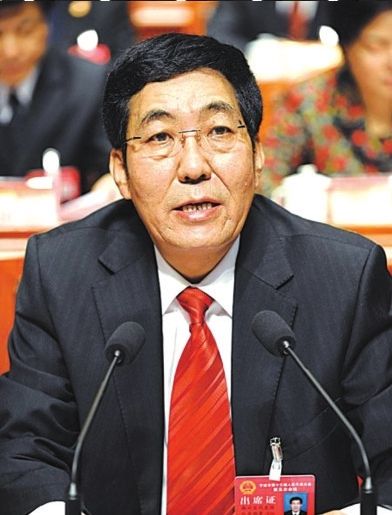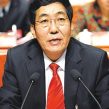
Regional Chief Selections Highlight Continuity in Leadership Development
Publication: China Brief Volume: 13 Issue: 1

China has reshuffled the party and administrative leaderships of a dozen-odd provinces and directly-administered cities in the wake of the 18th Chinese Communist Party (CCP) Congress. The traits and political orientations of the new regional chiefs reflect the authorities’ priorities about seeking gradual changes while guaranteeing stability. At the same time, ample opportunities have been afforded to a handful of Sixth Generation leaders—a reference to rising stars born in the 1960s—to build up their national stature and reformist credentials.
Beijing’s preference for continuity is reflected in the fact that leadership changes in several provinces and major cities simply have involved internal promotions. For example, the just-named party secretaries of Shanghai, Jilin, Shaanxi and Zhejiang, respectively, Han Zheng, Wang Rulin, Zhao Zhengyong and Xia Baolong are former governors or mayors of the same jurisdictions. The newly-appointed governors or governors-designate of Guizhou, Zhejiang, Shaanxi, Shanxi and Jilin, respectively, Chen Min’er, Li Qiang, Lou Qinjian, Li Xiaopeng and Bayin Chaolu, also had worked in senior positions in the same provinces (Xinhua, December 19; China News Service, December 19). It is significant that Party Secretaries Wang, age 59, and Xia, age 60, as well as Governor-designate Li Qiang, age 53, had worked as secretaries of the Political-Legal Committees that run the police and judicial apparatus of their provinces. The law-and-order experience of Shaanxi’s Zhao, age 61, is even more considerable. He is a former police chief of Anhui Province as well as the chief of the Political-Legal Committees of Anhui and Shaanxi. This testifies to the importance that Beijing attaches to “social management,” a euphemism for stifling dissent and minimizing challenges to the regime (Ming Pao [Hong Kong] December 19; Ta Kung Pao [Hong Kong] December 18).
The top leadership’s preoccupation with stability also is evidenced by the fact that the regional reshuffles have largely followed late patriarch Deng Xiaoping’s famous “principle of the five lakes and four seas.” This is a reference to a rough balance of factions, administrative specialties and places of origin among the country’s senior cadres. For example, Guangdong’s new Party Secretary Hu Chunhua and Jilin’s Bayin Chaolu are members of the Communist Youth League (CYL) Faction headed by President Hu Jintao. Han Zheng, age 58, who spent the bulk of his career in Shanghai, has close links with both the CYL Faction and the Shanghai Faction led by ex-president Jiang Zemin. Moreover, Han’s replacement as Shanghai Mayor, Executive Vice Mayor Yang Xiong, age 59, is also a veteran Shanghai cadre. The appointments of Han and Yang as the two top officials of Shanghai have continued the tradition of “Shanghai-nese running Shanghai” (Ming Pao, December 21; People’s Daily, December 20; Wen Wei Po [Hong Kong] December 19). Li Xiaopeng, who is the eldest son of former premier Li Peng, is among the few Fifth Generation “princelings” who are deemed to have potentials for further advancement. The latest appointments also feature protégés of General Secretary Xi Jinping and Premier-in-waiting Li Keqiang. For example, Guizhou Governor-designate Chen Min’er, age 62, was Director of Zhejiang’s Propaganda Department when Xi was party secretary of the coastal province from 2004 to 2007. Finally, Fujian’s new Party Secretary You Quan, age 58, a long-time State Council bureaucrat, is deemed a protégé of Li Keqiang’s (China Daily, December 19; Sina.com, December 5).
Relatively few of the new faces have a reformist track record. Nor do they appear to be charismatic leaders or what the Chinese media used to call “cadres with personality” (gexing ganbu). Their elevation seems to be based on the long-standing principle that, as General Secretary Xi has reiterated, cadres “should have both moral rectitude and professional competence, with priority given to moral rectitude” (People’s Daily, October 23; China News Service, December 19, 2011). In the Chinese context, “moral rectitude” is shorthand for unthinkingly toeing the party line. It is not surprising that the first speeches made by several regional chiefs upon assuming their new offices consisted of a declaration of fealty to the central party leadership (zhongyang). Thus, Zhejiang Party Secretary Xia vowed to “closely rally behind the zhongyang with comrade Xi Jinping as general secretary, and to resolutely fulfill the responsibilities that the zhongyang has entrusted me.” Similarly, the new party boss of Inner Mongolia Wang Jun pledged he would “in the areas of thought, politics and action stay at a high level of unison with the zhongyang with comrade Xi Jinping as general secretary” (Xinhua, December 18; China Daily, December 18).
Most of the new appointees are veteran party apparatchiks with dubious professional competence particularly in areas such as finance, management or information technology-related innovation. Take, for example, Tianjin’s party boss Sun Chunlan, the former Fujian Party Secretary who is one of only two female members of the Politburo. The specialty of the 62-year-old Sun, who began her career as a laborer in a watch factory in Liaoning, is running “mass organizations.” Before her transfer to Fujian, Sun had headed the provincial branch of the All China Women’s Federation and the All China Federation of Trade Unions (People’s Daily, December 23; Xinhua, November 22). Questions, thus, have arisen as to whether she is the best leader for metropolis of Tianjin, which prides itself as China’s new hub for finance and high technology. Among the newly promoted regional chiefs, Shaanxi’s governor-in-waiting Lou seems to have the best professional qualifications. A computer expert with a Ph.D. in engineering, Lou served for 11 years as a deputy minister in the Ministry of Information Industry and the Ministry of Industry and Information Technology before becoming vice governor of Shaanxi in 2010. In the past two years, Lou was credited with having lured a record number of high-tech multinationals into the landlocked province (China Daily, December 22; Huashang Daily [Xi’an] December 21).
Most attention, however, has been focused on two Sixth Generation stalwarts, Hu Chunhua and Sun Zhengcai, who were inducted into the Politburo at the 18th Party Congress. There is speculation in the Hong Kong media that Hu (who is not related to Hu Jintao) might succeed Xi Jinping as general secretary and that Sun would replace Li Keqiang as premier ten years down the road (Ming Pao, November 16; Hong Kong Economic Journal, November 15). Judging by professional qualifications alone, Sun, who has taken the hot seat of Chongqing, seems to have the edge over Hu, who is a specialist in party affairs. A renowned agronomist and former deputy chief of the Beijing Institute of Agriculture Sciences, Sun served for three years as minister of agriculture before becoming Jilin party secretary in 2009. According to the new CCP Organization Department Director Zhao Leji, Sun was, apart from being “steadfast in politics and rich in leadership experience,” “familiar with party affairs and economic work.” Zhao also praised Sun for having “broad perspectives” on a wide range of issues of governance (Chongqing Daily [Chongqing], December 21; China News Service, December 21).
Hu Chunhua, who took over from the reformist Politburo member Wang Yang as Guangdong party secretary in mid-December, is a veteran party functionary with scant exposure to areas such as finance, foreign trade or high technology. Having spent 19 years in Tibet and three years in Inner Mongolia, Hu has ample experience dealing with tough law-and-order situations, including defusing the anti-Beijing plots of Tibetan and Mongolian separatists. It is doubtful, however, whether the fast-rising star can satisfactorily accomplish the task, first set by predecessor Wang, of turning the Pearl River Delta from “world factory” into a global innovation hub. It is perhaps significant that upon taking over his Guangdong job, Hu hewed to the CCP tradition of giving top priority to establishing a trustworthy and combat-ready corps of cadres rather than reforming institutions and systems of governance. “We must put together a [ruling] team that is united, capable, influential and full of combative [spirit],” the Hubei-born Hu told local officials (Guangzhou Daily [Guangzhou], December 19; China News Service, December 19).
It is unique to China that almost all members of its top ruling council, the CCP Politburo Standing Committee (PBSC), since the end of the Cultural Revolution are former party secretaries of provinces, autonomous regions or directly administered cities. Amongst the seven newly-appointed PBSC members, only Liu Yunshan, who is in charge of the CCP Secretariat, has never been a provincial party boss. As the mass-circulation Global Times put it in a commentary, provincial party secretaries constitute an elite “talent pool” for the CCP’s highest echelon. “It is the requirement of the Chinese system that the provincial party secretary must have the ability to handle the full range of [political] situations,” the paper said, “They need to have a large ‘magnetic field,” a sense of authority and ability to project personal warmth. They must also have a very high level of expertise and perceptiveness” (Global Times [Beijing], December 19). There seems little doubt that all the newly-elevated party secretaries—and to a considerable extent, governors—have passed muster in terms of tackling tough political challenges as well as abiding by Beijing’s instructions. The jury is still out, however, on the equally pivotal issue of whether they can break new ground in reform as General Secretary Xi pledged to do during his trip to Shenzhen in early December.





